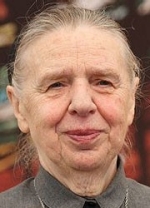Zofia Józefa Zdybicka

Date and place of birth: 5 August 1928, Kraśnik Lubelski, Poland
Religious ordination: 1957
Appointment to the Academy: 16 December 1999
Scientific discipline: Philosophy, Metaphysics, Philosophy of Religion
Academic title: Professor
Academic awards and distinctions
Ph.D., Catholic University of Lublin, 1965 – Habilitation, 1970 – Professor, 1978; Research Fellow, Yale University, New Haven, U.S.A., 1977-78; The Catholic University of America, 1978; The Catholic University of Leuven (Belgium) (1972, 1981, 1984, 1990, 1991, 1994, 1995); Head of the Chair of Philosophy of Religion – since 1973, Dean of the Faculty of Philosophy of the Catholic University of Lublin, 1986-1987, 1990-1999; Member of the Social Council of the Primate of Poland (1983-1987); Member of the Polish Episcopate Scientific Committee; Member of the Polish Episcopal Committee Justitia et Pax; Member of the Polish Episcopal Committee for Culture; Committee for Philosophical Sciences of the Polish Academy of Sciences; the Polish Philosophical Society; Scientific Society of the Catholic University of Lublin; founding member of the Polish Society of St Thomas Aquinas, ‘Man and Religion’; Book of the Year 1977 awarded by the Council for Science of the periodical ‘Life and Thought’; Woman of the Year 1998 – American Biographical Institute; prize of the Rector of the Catholic University of Lublin (19.12.1996); the Golden Merit Cross, no. 3023-78-9 (06.11.1978); The Cross of the Order Polonia Restituta, no. 189, 2000-74, (09.08.2000).
Summary of scientific research
My research interests focus on the problems of God and religion. Against the background of prevailing attitudes in contemporary philosophical reflection upon God and religion, I point to the irreplaceable value of a metaphysical cognition of God, although I also strive to provide an epistemological and methodological background to my position. Another focus of my interest is the problem of God’s transcendence and immanence in relation to the world, as considered in the classical theory of a participation. To this particular problem I devoted a separate study in which I engage in a dispute with other theorists of participation, such as C. Fabro, Geiger and others. For more than twenty-five years my chief interest has been the phenomenon of religion: its essence, the causes of its existence, the role it plays in human life and in culture. The result of the discussion of these problems, often carried out from a position contrary to other solutions, was the establishment of the philosophy of a religion as a discipline in its own right, set within a wider framework of classical realistic philosophy. In this framework, philosophy of religion collaborates with anthropology (the theory of personal being) and metaphysics (which brings the personal God into the picture). In this perspective, religion is envisaged as a relationship which relates man to the personal Absolute, recognised by man as the ultimate source of his existence and the Highest Good – the ultimate end of his life, the end that gives a meaning to his existence. In many of my works I also consider the role played by religion in contemporary culture, and the relationship between religion on the one hand, and science, morality, art, and politics on the other.
Main publications
A selected list out of 250 titles Partycypacja bytu. Próba wyjas´nienia relacji mie˛dzy s´wiatem a Bogiem, Lublin 1972; Poznanie Boga w uje˛ciu Henri de Lubaca, Lublin 1973; Czl⁄owiek i religia. Zarys filozofii religii, Lublin 1977, 2nd ed., revised and enlarged, Lublin 1993; Person and Religion. Introduction to the Philosophy of Religion, Peter Lang, New York-London 1991; Les voies de l’affirmation de Dieu, “Collectanea Teologica” 1979, pp. 137-214; Function of Religion in Forming a Personal model of Culture, in: Theory of Being, Lublin 1980, pp. 241-251; Rola religii w kulturze, Roczniki Filozoficzne 28 (1980), fasc. 2, pp. 5-16; Utopia – przyszl⁄os´c´ – nadzieja, Znak 36 (1984), no. 349, pp. 1355-1376; Filozofia a koncepcja i afirmacja Boga, Roczniki Filozoficzne 33-34 (1985-86), fasc. 2, pp. 15-40; The Anthropological Bases of Religion, in: Existential Personalism, ‘Proceedings of the American Catholic Philosophical Association’, vol. 60 (1986), pp. 178-184; Religia i religioznawstwo, Lublin 1988, 1992; Nauka – s´wiatopogla˛d – religia, Warszawa 1989, editorship; Pytanie o istnienie Boga a moz˙liwos´c´ ateizmu, in: W nurcie zagadnien´ posoborowych, Warszawa 1990, pp. 173-188; Zadania filozofli we wspól⁄czesnej kulturze, Lublin 1992, editorship; Wprowadzenie do filozofii, Lublin 1992-1996 (with others); Religia a polityka, Roczniki Filozoficzne 41 (1993), fasc. 2, pp. 41-58; Religia a sens bycia czl⁄owiekiem, Lublin 1994, editorship; Spel⁄nianie sie˛ osoby ludzkiej w religii, in: Ratio et revelatio, Opole 1998, pp. 53-60; Freedom in Contemporary culture. Acts of the V World Congress of Christian Philosophy, vol. I, Lublin 1998, vol. II, Lublin 1999, editorship; Bóg czy sacrum?, in: Zadania wspól⁄czesnej metafizyki. Poznanie bytu. czy tl⁄umaczenie sensów, Lublin 1999, pp. 189-217; Czym jest i dlaczego istniej e religia?, in: Religia w s´wiecie wspótczesnym, Zarys problematyki religiologicznej, Lublin 2000, pp. 22; Religia a kultura, ibid., pp. 167-183; Orsola Ledóchowska. Santa dei tempi difficili e segno di speranza, Città del Vaticano 2004; Pel⁄ny zwrot antropologiczny. Najwie˛ksze dokonania Jana Pawl⁄a II [La piena svolta antropologica. Le realizzazioni di Giovanni Paolo II], Kwartalnik Filozoficzny, Vol. 33, q. 4, 2005, pp. 115-136; Analogia i partycypacja w wyjas´nianiu rzeczywistos´ci [Analogia e partecipazione nella spiegazione della realtà], in: Philosophiae et musicae, Cracovia 2006, pp. 669-680; La ragione e la religione in San Tommaso e Kant, Doctor Communis. Atti della Sessione Plenaria 24-26 giugno 2005, Città del Vaticano 2006, pp. 187-200.



